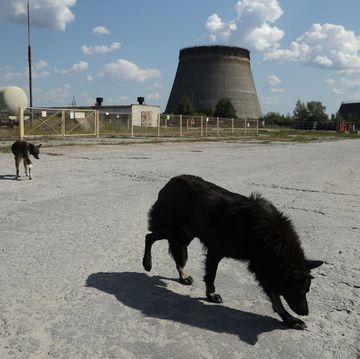Darren Orf
Contributing Editor
Darren lives in Portland, has a cat, and writes/edits about sci-fi and how our world works. You can find his previous stuff at Gizmodo and Paste if you look hard enough.

Scientists Found an Unexpected Toxin Floating in the Oklahoma Sky
Medium-chain chlorinated paraffins, or MCCPs, have been detected in the air of Asia and Antarctica, but this surprise Oklahoma discovery is a first for North America.

The ‘Gates of Hell’ Are Closing. That’s a Pretty Big Problem.
This natural gas field in Turkmenistan has been on fire for decades, but officials say it may soon be running on empty.

A Youtuber Built a Laser Gun That Can Set Copper On Fire
This death ray is 50,000 times more powerful than the legal limit—and just as blinding as you’d expect.

Mathematicians Are Getting Closer to Translating an ‘Alien Language’
Understanding the famously complex Inter-universal Teichmüller Theory could solve mathematics' greatest problems.

The Dogs of Chernobyl Are Experiencing Rapid Evolution, Study Suggests
Have the canines acquired strange mutations living near the power plant?

A New Type of Propulsion Could Revolutionize Space Travel
Nuclear engines are the future of spaceflight, but exactly which kind is still up for debate.

This Particle Isn’t Following the Rules of Physics. Maybe the Rules Are Wrong.
After six years of collecting data, the muon g-2 experiment released its results and could chart a new path for particle physics.

Some Black Holes May Be Portals Through Spacetime In Disguise
For years, scientists have theorized that some black holes could actually be wormholes, and a new study shows that this space-time mimicry could in fact be possible.

A New Kind of Concrete Can Grow and Repair Itself. How? It’s Alive.
Self-healing concrete could be greener, more resilient, and longer lasting than the standard variety.

Dinosaurs Had Cancer, Too, According to a Staggering New Study
Understanding the molecular history of cancer could help scientists discover new treatments for the modern age.

A New Study Says You Can Delay Death—but Not the Speed of Aging
The rate of human aging is remarkably constant, even if it does begin later in life.

A Theory Says We Can’t Find Advanced Aliens Because They’re Not Trying to Be Found
Sustainability may be an unavoidable feature of advanced civilizations, making advanced technology “indistinguishable from nature.”

Humanity May Achieve the Singularity Within the Next 6 Months, Scientists Suggest
Predictions across the field range from a few months to a few decades, but experts agree—change is coming.

You Can Develop a Sixth Sense—And Transform Your Perception of Reality
It may seem remarkable, but significant evidence shows that humans could learn this sound-based “superpower” with some practice.

Astrophysicists Discovered Strange New Objects in Our Galaxy ‘Unlike Anything Else’
Located in the Central Molecular Zone (CMZ), these filaments could be a part of a cyclical process in one of the galaxy’s most mysterious regions.

A New Device May Have Just Made the Internet 10x More Powerful
The internet’s fiber optic backbone already travels at the speed of light, but researchers have found a way to drastically increase its bandwidth.

A Truly Wild Study Suggests Human Intelligence Might Exist Because of Gravity
First detected in 2015, gravitational waves may not have had a direct hand in human evolution, but it certainly helped set the stage for its arrival.

Scientists Are Pretty Close to Replicating the First Thing That Ever Lived
At some point, RNA must have replicated itself before the evolutionary arrival of DNA and proteins, and now we might know how.

Gravity May Be Key Evidence That Our Universe Is a Simulation, Groundbreaking New Research Suggests
If it’s true, this work could have ramifications for some of the biggest mysteries of the universe, including learning where we came from.

Aliens Might Be Talking, but Our Ears Aren't Quantum Enough to Hear Them, a Scientist Says
And the logistics to make it work are overwhelming.

This $35,000 Computer Runs on Human Brain Cells. Scientists Say It’s Not Conscious—Yet.
The path toward our mind-machine merger never has never seemed clearer.

A Hidden Blob Beneath Africa Is Fueling Volcanoes—and It Could Split the Continent in Two
Stretching 4,000 miles, the East African Rift System is one of the largest in the world—and scientists just uncovered the hidden force tearing it apart.

A Copper Treasure Lies Hidden Beneath the Andes. Getting It Out May Not Be Worth the Danger.
The Filo del Sol deposit high in the Argentine Andes likely contains five times more metal than previously believed, but many environmental concerns remain.

An Unknown Microbe Snuck Onto China's Space Station. Could It Infect the Universe?
Researchers are even finding new bacteria thriving in NASA’s clean rooms.

Astronomers Spot a Strangely Perfect Sphere Thousands of Light-Years Away
No, it isn’t aliens.

Scientists Edited Genes Inside a Living Person for the First Time—and Saved His Life
With grim prognosis hanging overhead, doctors and scientists at universities and institutions across the U.S. worked tirelessly to develop the world’s first custom gene-editing therapy to save the life of a newborn.

An Apocalypse of Toxic Fungi Could Threaten Millions of Lives Within 15 Years
A new study tracks the proliferation of fungal pathogens among various climate change scenarios—and it’s not good news.

A Teenager Discovered a Ring on a Hike—Turns Out, It’s 1,800 Years Old
The ring features an engraving of the Roman goddess Minevera.

Scientists Say Hidden Hydrogen Could Power the World for 170,000 Years
If we can extract it.

Out-of-Body Experiences Suggest Consciousness May Exist Outside the Brain, Some Scientists Say
Our awareness of the world and ourselves is a mystery. Could this help us solve it?

AI Will Double the Human Lifespan By 2030, Tech CEO Claims. Is This the Dawn of Immortality?
If humans make it to 150 years old—known as aging “escape velocity”—we could choose exactly how long we’d like to live.

28 American Cities Are Literally Sinking Into the Earth
This slow-going subsidence is measured in just a handful of millimeters per year, but rising sea levels due to climate change complicates matters.